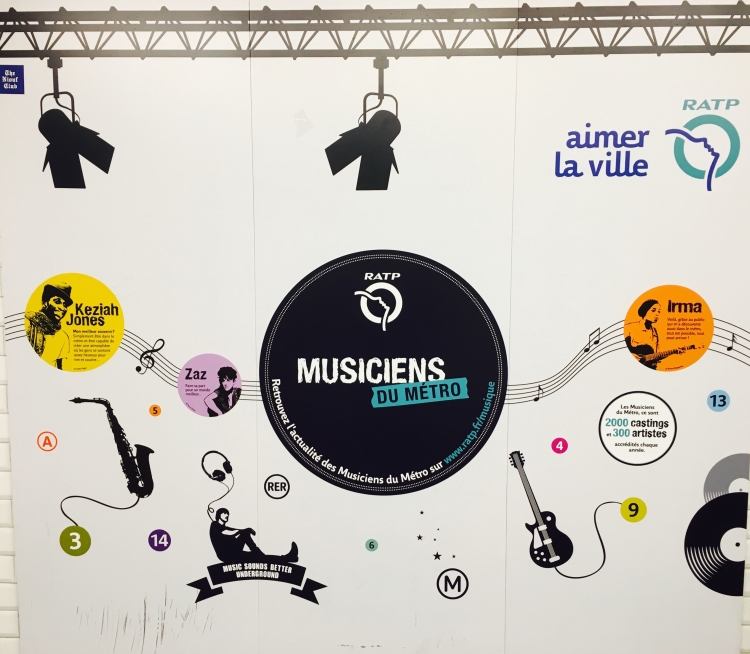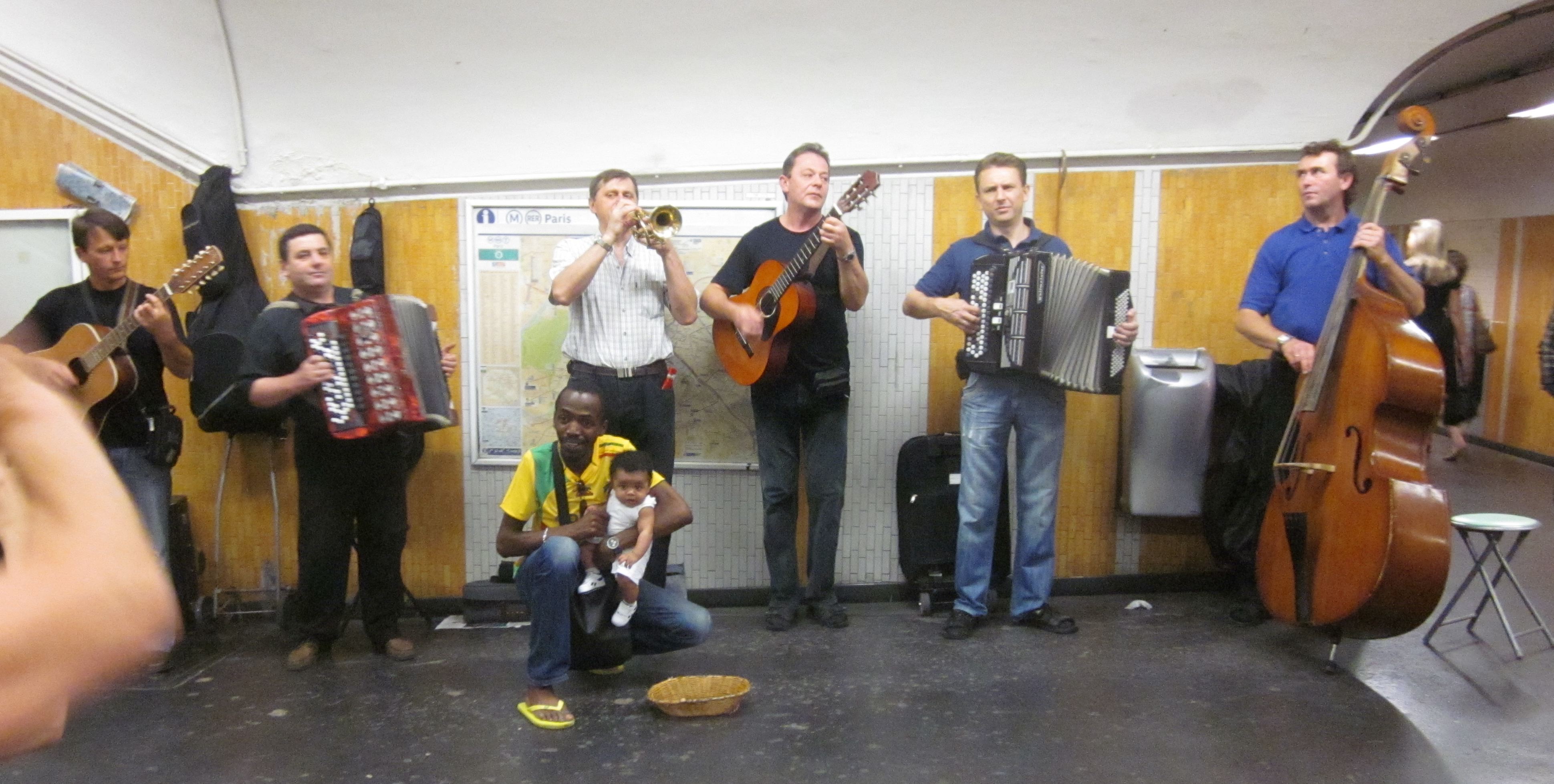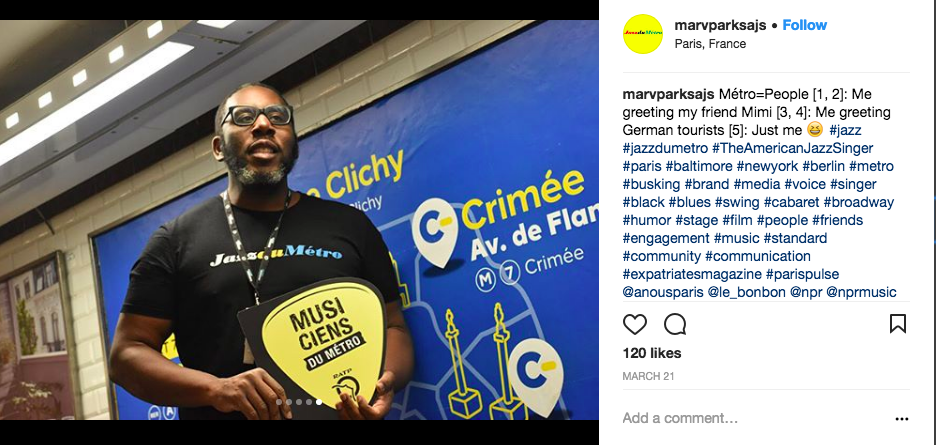The Metro's Got Talent

Every six months, 2,000 talented people from all over Paris audition to get a spot in the 300 available positions to perform their musical abilities in the Parisian metro stations. There are 14 lines with endless hallways to play in, some hallways with better acoustics than others. They need originality, pure talent, and radiant personalities in order to impress the judges. All 300 buskers need an official permit and ID card that is left out in plain sight for RATP workers to see- and every six months, they must try out again.
The idea is to show their musical talent for the thousands of people that commute every day in hopes to improve their skills and get work opportunities. It’s a part of the Parisian culture to walk through the metro and hear music echoing throughout the halls. These musicians strive to make a living off of their music, whether it be signed deals or just gigs in bars and clubs. Many of them have their CD laying out with their stage name on a sign, such as the group of Eastern European/ Russian men that are known to play at Concorde. They’ve gained fame for their jazzy ensemble by playing in the metro. The performers that come onto the actual metro and play with their speaker strapped to a box-mover are illegal buskers, searching for a few coins. They usually play cliché French music with accordions or simply pure vocals. Their talent can vary from great to painful to the ears. Occasionally, you’ll get an interesting show, like the man who performs a quick puppet act.
Jazz Group at Chatelet. Image Credit: WikimediaCommons / Doc SearalsAlicia, 20, and Damien, 29, play in a group together called Ali and Dam. Alicia says, “Our style is pop rock and folk music. We try to play more French but mostly English and rock. We love to do harmonies because we both love to sing.” They met at a Saturday brunch where Damien was performing. Alicia knew the song he was playing, so she got up and sang along with him. They decided to sing together from then on.
Playing in the metro is a good starting platform since most people casually walk by and pay little attention. Rarely do commuters stop to enjoy the music. After talking to a few buskers, many said that they actually enjoy the fact that people wiz by without looking. Alicia says that "it’s a good place to start, especially when you’re really trying to start in music and you can’t find a lot of gigs or money in the beginning." According to Alicia, the best part about playing in the metro is the amount of practice she gets in-"you can get a little bit of money by practicing your songs and trying new songs." She doesn't mind that most people just pass by, since "sometimes, by chance, people pass by who work in the music industry and say ‘Oh I’m doing this project’ and you exchange numbers and get to work with people.” This was their first time playing at metro Pigalle.
Ali and Dam playing at Pigalle. Image Credit: Chanet SmithMetro buskers include people from all around the world. A common beat commuters hear is the Afro-fusion music playing. A few different groups of men and women sing and play the drums, their strong beat vibrating the metro walls. Makhou, a 50-year-old man born in Senegal, plays with his guitar at Concorde. He uses the guitar strings and body to make beats that add to the flow of his voice. He’s lived in Europe for the past 30 years and finally settled in Paris. Makhou defines his style as "Afro-fusion. I am African. I write my music. This guitar is my composition.” As for the busking aspect, Makhou sees it as his job: “I like to play for people during the week. I sing. It’s good for me, it’s good for my voice, it’s good for practice.” He also takes up gigs in bars, restaurants, and nightclubs around Paris. He enjoys playing in the metros because there is no microphone. The walls are his acoustics. His favorite metro stop for acoustics was Bastille.
Makhou playing at Concorde. Image Credit: Chanet SmithThe hardest part about finding these musicians is there is no set date, time, or location that they will be at. If you’re walking through, you just have to follow the music echoing in the halls. An older man, born and raised in Paris and calls himself the ‘RATP-music-man’ says, “my favorite metro is all the stations. I play one hour here, then I will move to another metro, then I go home. I am the senior category of the metro musicians. I am retired so I don’t play for money.” He starts out his performance by tuning his A-string on his violin, then the rest of the strings are easily tuned. Right away, he jumps into his first song, ‘I love Paris’ by Frank Sinatra. He says as he plays “all styles of music. Practical, jazz, I improvise too.” He smiled, then asked what song I would like him to play next in his thick French accent.
"I auditioned and come out when I want because I have a passion for music."
RATP Music Man playing at Concorde. Image Credit: Chanet SmithMost of the buskers said that their favorite metros were Bastille, Concorde, or Hotel de Ville. But Marvin Parks, an American jazz singer, has created a known spot for himself at metro La Motte-Picquet Grenelle and Madeleine. He brands himself as JazzduMétro or Marvin Parks on Instagram and Facebook. His instrument is his voice, and he enjoys singing jazz and traditional pop music. He has a different approach to playing in the metros, as his story is a unique one: “an ATM took my card one night shortly after I arrived in Paris, and the next day I began singing acapella in the subway station near my apartment. I have now been singing in the metro for more than four years. Although people are generous, I never ask for money. I merely ask that they follow me on Instagram and Facebook.” His best experience from playing in the metros are “the smiles of the people who pass, and when someone hears something familiar and sings along. On Christmas Eve 2015, when I was informed that an article about me had been published on Le Monde’s website, I went to the metro to continue singing and to tell people about my show that would happen the next night.”
Marvin Parks playing at La-Motte Picquet Grenelle. Image Credit: Instagram/ MarvparksajsAll 300 of these musicians work hard for their place to play in the metros. They all have the passion of music and playing for the people in common. Whether it be their side job, main job, or just a hobby, they've come from around the world to perform their talent for every commuter in Paris. These passionate buskers set out daily to do what they love purely out of love for music. Next time you see someone playing, stop to enjoy the music resonating in the halls and smile at the great men and women that have strived for their place to perform in the great Parisian metros.









